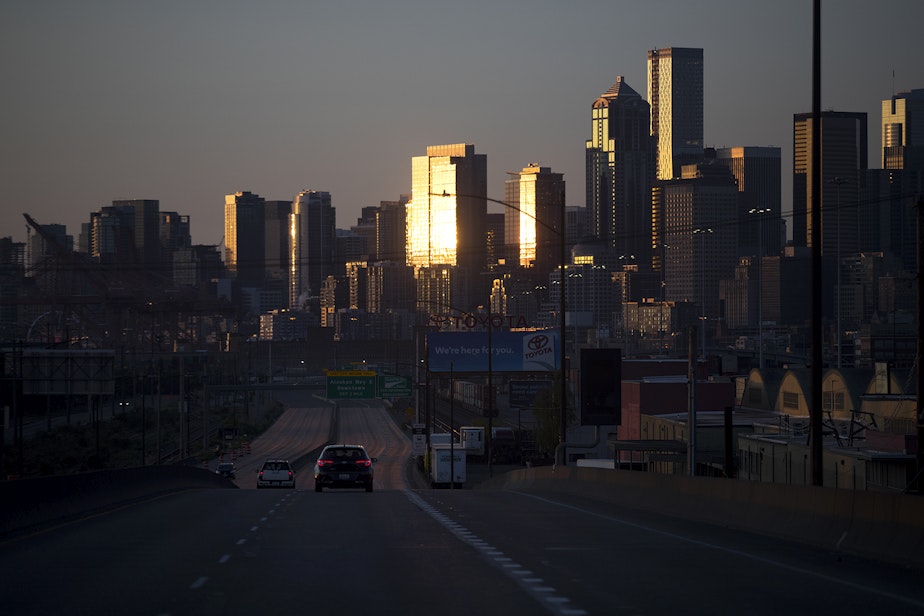One year into the pandemic, how will downtown Seattle thrive again?

Over the last year, the pandemic has taken a major toll on downtown Seattle's business community. Even with more vaccines on the horizon, the future of downtown Seattle remains uncertain.
Jon Scholes is President of the Downtown Seattle Association. He spoke with KUOW’S Kim Malcolm about how downtown can recover from the pandemic, and what needs to be reimagined to bring people back.
I remember talking with you soon after the pandemic started, and you described looking out of your window and seeing hardly anybody on the street. What are you seeing today?
Jon Scholes: We have more activity than that now. Some office workers are back, and of course essential workers. There are things that are open today that were not open a month ago, museums like the Seattle Art Museum and Wing Luke. The Pike Place Market has been just a great bright spot through all of this. They've never closed, and they've had to adjust plenty. So, that's a note of activity, with a lot of tourists there. But it’s been mostly locals that are coming from other neighborhoods in Seattle. There's activity downtown, but we sure want more.
The pandemic did take a major toll on downtown businesses. Can you give us a nutshell of just what happened over the last year?
Scholes: We all know that downtown areas are all about bringing people together. And then there’s a pandemic and we're all told to stay apart and for good reason. So this pandemic has had a disproportionate impact on urban areas in our country and downtown Seattle. So we've had 160 small businesses that have permanently closed, those are restaurants and retailers. Office occupancy has been, below 20% over the last couple of months of folks who have been showing up a few days in their office during the week. Hotel occupancy is still hovering at 20% or below in some weeks. And our major venues: arts, culture, performance, live music -- have been shuttered for the most part, throughout this period. So this has been devastating economically, to our downtown and to downtowns across the country. Because when you're all about bringing people together, a pandemic has a significant impact on how you function. And that's what we've seen.
We haven't turned a corner quite yet. But it does seem that most adults who want a vaccine will be able to get one in the next few months. What could that mean for the future of downtown?
Scholes: It really is a game-changer. It's going to allow office workers to return at some level, and we're talking to employers and companies that are making those plans now. And it's going to allow for leisure travel to resume at higher levels throughout our country. Seattle can compete really well for the domestic leisure travel business, which we believe is going to be the first type of travel to return, likely before business travel and likely before international travel. People are dying to get out. We want them to come to Seattle. And the Seattleite that hasn't been downtown in the last year, we want to invite them back. There's plenty that is open today and more to come.
Some folks are speculating that this pandemic has forever changed the nature of work and that many employees may simply work from home indefinitely, which could mean way fewer people shopping and dining downtown. Are you worried about that potential shift?
Scholes: I do believe the office (and work) gets recalibrated. But the office isn't going away by any means. But does it mean that some folks might work from home one or two days a week? That's generally what research and surveys, both in our own community and around the country are saying. So downtown offices still have an important role to play when it comes to work and collaboration, and shaping an organization's culture. But I do think it gets recalibrated, no doubt.
If you've got fewer workers around, who else could be drawn down to the core to make up for the flow of energy that used to be there?
Scholes: We’re still investing record levels in housing in downtown. More than 7,000 units of housing are currently under construction. We're connecting our city to downtown in ways that are going to allow people to take a train from Northgate in just a few months. So there are new ways to get downtown. And then we're investing in generational infrastructure projects like the waterfront park and a great new arena at Seattle Center. So, there's going to be new things to see and experience downtown that weren't there prior to this pandemic. And there are going to be lots of new businesses that come into spaces that were vacated by businesses that had to close through this pandemic. We want to celebrate those in addition to everybody that made it through this pandemic, and that's able to reopen.
Is there a scenario where you might see that the downtown doesn't recover? And what would that look like? And what would that mean?
Scholes: There’s a lot at risk here. And I don't think we can take anything for granted. Every great city has a great downtown. I haven't been to a great city without a thriving urban core. Here in Seattle, we've made a big bet on a healthy, thriving downtown. We've passed many levies to invest in families and education, universal pre-K, low-income housing, and a great park system that is betting on a healthy, economically vital downtown. So we have a lot at stake on what happens on these three square miles of land for the entire city and really the entire region. So, we've got to get this right and we can't take anything for granted.
Listen to the interview by clicking the play button above.
This interview has been edited for clarity.


